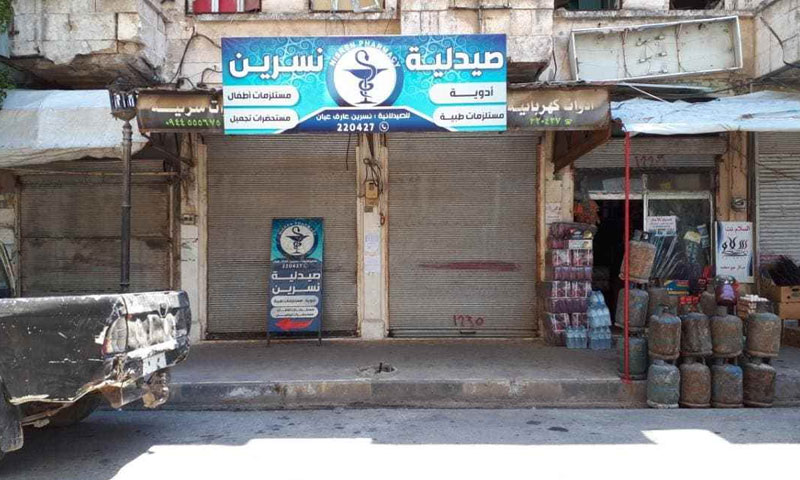“She came back home from the hospital with full energy. Hours after her recovery, her health condition gradually started deteriorating, only to lose her life after being transferred to the hospital again.” In these words, Abu Mohammed from Jericho described the illness of his wife Fatima, 60, who was suffering from flu and severe cough, forcing him to urgently transfer her to a hospital and give her an analgesic syringe of Diclofenac (Diclon).
Despite the fact that Abu Mohammed did not confirm that the reason for his wife’s death is the analgesic syringe or the doctors’ diagnosis of the syringe being the direct cause, he fears that it may be an indirect cause because his wife was suffering from hypertension and diabetes, pointing out that doctors had previously warned him from giving her the Diclon syringe because of its side effects on patients suffering from hypertension.
In Syria in general and in Idlib and its countryside in particular, the Diclon syringe has become prescribed by doctors and pharmacists as the fastest painkiller without the illnesses diagnosis by a specialist doctor, leaving unexpected side effects.
Maher Sarhan, 55, from the town of Ihsim in Jabal Zawiya, talked to Enab Baladi about his chest pain. When he consulted a doctor, he directly injected him with the Diclon syringe. “When the syringe’s effect ends, the pain comes back. I saw another doctor where I found out that I had inflammation of the respiratory tract and lungs,” says Sarhan.
Diclon syringe: a painkiller
Diclofenac, a non-steroidal anti-inflammatory, acts as a painkiller, antipyretic and anti-inflammatory medicine, and has side effects. It weakens the protective layer of the gastric membrane, starts ulcers, increases bronchospasm for patients suffering from bronchial asthma, and causes mild hypertension for patients suffering from high arterial pressure, according to the Health Minister in the Salvation Government, Ahmed al-Jarak.
“Diclon is not addictive and is prescribed as a painkiller, anti-inflammatory and anti-inflammatory medicine,” explained al-Jarak in an interview with Enab Baladi, pointing out that mixing it with other medicine is not advisable. It can cause a reaction between two medicines and may produce new and unknown substances.”
For her part, the pharmacist Sawsan Al-Saeed explained that “Diclon” injection is given as a tranquilizer for articular pain in particular, and is used extensively as an analgesic, and control over its use is now declining, like any other drug since it does not belong to the group of tranquilisers used by patients.
However, Al-Saeed stressed that before giving the injection we should first take into account the age and health of the patient, especially if he is suffering from a problem of pressure, diabetes or heart problems. Pharmacists must take responsibility for dealing with human lives, with regard to Diclon injection or any other medicine.
Idlib’s Chief Pharmacist, Yahya Nima said that “Diclon is a useful drug and often fulfils its purpose. It is one of the most widely used drugs in the medical field.” However, he warned against using it in cases known to the doctor and pharmacist, most notably pressure, asthma, and ulcers patients.
Strict control
Nima explained that there are two types of drugs, the first type is given over-the-counter, such as painkillers, antipyretics and cough syrup, and there are serious drugs that should be given only within the regulations set by the Pharmacists Syndicate in cooperation with the Directorate of Health, such as psychiatric and psychedelic drugs seized within a given registry and giving system, where the patient should have a documented prescription with a doctor’s stamp, which indicates the number of pills and the way and duration of use.
He attributed the spread of giving Diclon randomly to the spread of pharmacies that violate the law, which he described as “shops selling medicine controlled by people who are intruders to the profession who pretend knowledge of medicine, and abuse the health of patients and cause great and ill-considered damage.”
The Chief Pharmacist confirmed that the syndicate is working with the help of the Health Directorate to combat the pharmacies which violate the law. He pointed out that there are no statistics on the damage caused by these pharmacies, but he expected great harm. He noted that “the syndicate has made a quantum leap forward in prosecuting blood dealers.”
Nima stressed the punishment of violators, which are disciplinary punishments that fall within the framework of the organization of the profession, and start with alerting and warning, before reaching financial penalties. However, in the event violations recurred, violators are referred to a disciplinary board headed by a judge, and the penalty may even reach the closure of the pharmacy.

